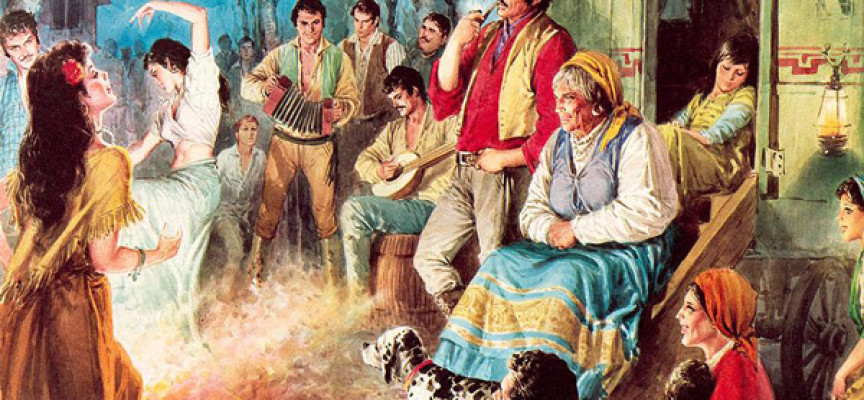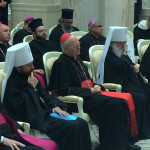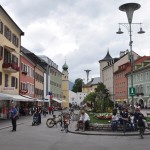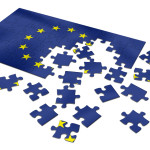Conference of European Churches (CEC) and Council of European Bishops’ Conferences (CCEE) message on the occasion of International Roma Day
Today some 10 to 12 million Roma live throughout Europe, and are among the most deprived and marginalised people of our continent. They face daily discrimination and are often denied access to basic schooling, housing, and healthcare.
A long history of antiziganism have led to these deplorable conditions. For centuries, Roma were enslaved, tortured, murdered, and their families broken apart. They suffered legal persecution, were segregated from society and denied basic civil rights. Despite all this Roma minorities have survived and preserved their culture. In working to change perceptions, we are aware that everyone—Roma and non-Roma alike—will have to engage in meaningful dialogue, which will help overcome fears and work for integration respectful of Roma identity.
On the occasion of International Roma Day, 8 April, the general secretaries of the Conference of European Churches (CEC) and the Council of European Bishops’ Conferences (CCEE) call for renewed efforts for healing and reconciliation.
“We encourage our Christian communities in Europe to continue to support Roma wellbeing and actively work to end hate speech and social exclusion.
We must journey together. We appeal to all to welcome the marginalised and uphold their human dignity as a gift from God. Roma people, with their unique traditions, faith, and culture are also called to bring their values to European society as responsible citizens.
The Roma have a centuries-old sense of shared European identity and free movement across political, cultural, and religious boundaries. They are one of the indigenous European nations, however, without an equal standing in terms of respect or honour among them. More than 600 years after their migration to Europe, their full reception remains incomplete. The fact that they live under circumstances of continued discrimination and even persecution is a disgrace to all European countries. We need to acknowledge their situation, through the centuries, in the Holocaust and presently, and our responsibility for it.
The principal way out of the present difficult situation of the Roma people and their families is learning, work, and faith. Their inclusion is a necessary indication of our commitment for a shared European identity and the free movement of people, commerce, and ideas in the European realm”.
Messaggio della Conferenza delle Chiese Europee (Cec) e del Consiglio delle Conferenze Episcopali d’Europa (Ccee) in occasione della Giornata Internazionale dei Rom
In Europa oggi vivono tra i 10 e i 12 milioni di Rom: essi sono tra le persone più svantaggiate ed emarginate del nostro continente. Affrontano quotidianamente la discriminazione e a loro è spesso negato l’accesso a servizi scolastici di base, all’alloggio e all’assistenza sanitaria.
Una lunga storia di antiziganismo ha fatto sì che essi fossero lasciati in queste condizioni deplorevoli. Per secoli i Rom sono stati ridotti in schiavitù, torturati, uccisi, e le loro famiglie divise. Hanno sofferto persecuzioni a livello giuridico, sono stati messi ai margini della società e sono stati loro negati diritti civili basilari. Nonostante questo, queste minoranze Rom sono sopravvissute e hanno preservato la loro cultura. Nel tentativo di cambiare queste percezioni, siamo consapevoli che ognuno di noi — Rom o non Rom — dovrà impegnarsi in un dialogo serio per superare le paure, e che dovrà lavorare per un’integrazione rispettosa dell’identità Rom.
In occasione della Giornata Internazionale dei Rom (8 aprile), i Segretari Generali della Conferenza delle Chiese Europee (CEC) e del Consiglio delle Conferenze Episcopali d’Europa (CCEE) invitano a rinnovare l’impegno a favore della riconciliazione.
“Incoraggiamo le nostre comunità cristiane in Europa a continuare a sostenere il benessere dei Rom e a lavorare attivamente per porre fine a discorsi di odio e all’esclusione sociale. Dobbiamo camminare insieme. Ci appelliamo a tutti affinché gli emarginati siano accolti e sia riconosciuta la loro dignità umana in quanto dono di Dio. I Rom, con la loro tradizione, fede e cultura unica, sono anche chiamati a portare i loro valori all’interno della società europea, in quanto cittadini responsabili.
I Rom hanno un secolare senso di identità europea condivisa e di libera circolazione, attraverso i confini politici, culturali e religiosi. Sono una delle popolazioni indigene dell’Europa che non gode però di un trattamento di uguaglianza in termini di rispetto e onore tra le altre. A più di 600 anni di distanza dalla loro migrazione in Europa, la loro piena accoglienza rimane incompleta. Il fatto che essi vivano in circostanze di continua discriminazione e addirittura persecuzione è una vergogna per i Paesi europei. Abbiamo bisogno di guardare alla loro situazione attraverso i secoli, dall’Olocausto fino ai giorni nostri, riconoscendo la nostra responsabilità.
La via d’uscita principale a queste difficili condizioni dei Rom e delle loro famiglie passa attraverso la conoscenza, il lavoro, la fede. La loro inclusione è una necessaria indicazione del nostro impegno per un’identità europea condivisa e la libera circolazione delle persone, dei beni e delle idee in Europa”.
Message KEK-CCEE à l’occasion de la Journée internationale des Roms
Dix à douze millions de Roms vivent aujourd’hui en Europe et sont parmi les plus défavorisés et marginalisés sur notre continent. Ils sont confrontés quotidiennement à la discrimination et très souvent n’ont pas accès à l’éducation, au logement et aux soins de santé.
Ces conditions déplorables découlent d’une longue histoire d’anti-tsiganisme. Durant des siècles, les Roms ont été réduits en esclavage, torturés ou assassinés, et leurs familles brisées. Ils ont subi des persécutions légales, ont été mis au ban de la société et privés de leurs droits civiques fondamentaux. Malgré tout cela, les minorités roms ont survécu et préservé leur culture. Tout en œuvrant à changer les perceptions, nous sommes conscients que tous – Roms et non-Roms – nous devons engager un dialogue approfondi, afin de surmonter les peurs et de favoriser une intégration respectueuse de l’identité des Roms.
A l’occasion de la Journée internationale des Roms, le 8 avril, les secrétaires généraux de la Conférence des Eglises européennes (KEK) et du Conseil des Conférences épiscopales européennes (CCEE) exhortent à intensifier les tentatives de guérison et de réconciliation.
« Nous incitons nos communautés chrétiennes en Europe à poursuivre leurs efforts pour le bien-être des Roms et pour mettre un terme aux discours de haine et à l’exclusion sociale. Nous devons faire la route ensemble. Nous demandons à chacun d’accueillir les marginalisés et de faire respecter la dignité humaine qu’ils ont reçue de Dieu. Les peuples roms, avec leurs traditions, leur foi et leur culture uniques, sont aussi appelés à apporter leurs valeurs à la société européenne en leur qualité de citoyens responsables.
Depuis des siècles, les Roms vivent un sentiment d’identité européenne partagée et de libre circulation à travers les frontières politiques, culturelles et religieuses. Cependant, ils sont une des nations européennes indigènes ne bénéficiant pas d’un statut égal en termes de respect ou d’honneur parmi celles-ci. Plus de 600 ans après leur migration en Europe, ils ne sont toujours pas pleinement accueillis. Le fait qu’ils soient confrontés à des discriminations et même des persécutions constantes est une honte pour tous les pays européens. Nous devons reconnaître les épreuves qu’ils ont endurées pendant des siècles, y compris durant l’Holocauste et de nos jours, ainsi que notre responsabilité dans cette situation.
Pour sortir les peuples roms et leurs familles de la situation pénible actuelle, la voie principale est l’apprentissage, le travail et la foi. Leur inclusion est un signe indispensable de notre engagement pour une identité européenne partagée et la libre circulation des personnes, des biens et des idées au sein du domaine européen. »
KEK-CCEE Botschaft anlässlich des Internationalen Tages der Roma
Heute leben in ganz Europa zwischen 10 und 12 Millionen Roma: sie gehören zu den am stärksten benachteiligten und an den Rand gedrängten Völkern unseres Kontinents. Sie sind täglicher Diskriminierung ausgesetzt und der Zugang zu grundlegender Bildung, zu Wohnraum und Gesundheitswesen wird ihnen oft verweigert.
Eine lange Geschichte von Antiziganismus hat zu diesen beklagenswerten Bedingungen geführt. Über Jahrhunderte wurden Roma versklavt, gefoltert, ermordet und ihre Familien auseinandergerissen. Sie wurden gerichtlich verfolgt, vom Rest der Bevölkerung abgetrennt und ihre bürgerlichen Grundrechte wurden ihnen verweigert. Trotz alledem überlebten Roma-Minderheiten und bewahrten ihre Kultur. Wir sind uns bewusst, dass nur ein sinnbringender Dialog aller Beteiligten – Roma und Nicht-Roma- zur Veränderung der Wahrnehmungen führt: nur so können Ängste überwunden und eine Integration, die die Identität der Roma respektiert, erreicht werden.
Anlässlich des Internationalen Tages der Roma am 8. April rufen die Generalsekretäre der Konferenz Europäischer Kirchen (KEK) und des Rates der Europäischen Bischofskonferenzen (CCEE) zu erneuten Bemühungen für Heilung und Versöhnung auf.
„Wir ermutigen unsere christlichen Gemeinschaften in Europa, sich weiterhin für das Wohlergehen der Roma einzusetzen und aktiv daran zu arbeiten, Hassparolen und soziale Ausgrenzung zu beenden. Wir rufen alle auf, Randgruppen willkommen zu heißen und ihre menschliche Würde als ein Geschenk Gottes zu wahren. Auch Roma-Völker mit ihren einzigartigen Traditionen, Glaubensüberzeugungen und Kulturen werden aufgerufen, als verantwortliche Bürger ihre Werte in die europäische Gesellschaft einzubringen.
Die Roma haben eine jahrhundertealte Tradition von geteilter europäischer Identität und Bewegungsfreiheit über politische, kulturelle und religiöse Grenzen hinweg. Obwohl Roma zu den uransässigen Völkern Europas gehören, wurden sie nie als gleichwertig anerkannt und erhielten nie denselben Respekt und dieselbe Ehre wie andere Völker. Mehr als 600 Jahre nach ihrer Migration nach Europa sind sie immer noch nicht vollständig akzeptiert. Die Tatsache, dass sie unter fortgesetzter Diskrimination und sogar Verfolgung leiden, ist eine Schande für alle europäischen Staaten. Wir müssen ihre Situation im Laufe der Jahrhunderte, während des Holocausts und heute sowie unsere Verantwortung dafür anerkennen.
Der Ausweg aus der aktuellen schwierigen Situation der Roma und ihrer Familien besteht in Ausbildung, Arbeit und Glauben. Ihre Eingliederung in unsere Gesellschaft ist ein notwendiges Zeichen unseres Engagements für eine geteilte europäische Identität und die Freizügigkeit von Personen, Handel und Ideen in Europa“.
Latest posts by EURCOM (see all)
- What are the aims of the European security and defence policy? - 12 aprile 2017
- The Church is for the European project - 28 marzo 2017
- A message for Europe - 28 marzo 2017











